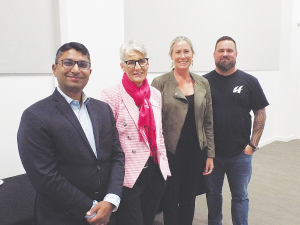Dairy Women’s Network welcomes AgriHealth as new partner
Dairy Women's Network (DWN) is welcoming AgriHealth as a new partner.
 From left, economist Shamubeel Equab, Jules Benton DWN, Jane Muir-DairyNZ and Aaron Jay, Hortus at the Peoples Expo in Waikato.
From left, economist Shamubeel Equab, Jules Benton DWN, Jane Muir-DairyNZ and Aaron Jay, Hortus at the Peoples Expo in Waikato.
With continuing levels of low unemployment, recruiting workers to any sector is a continuous challenge for any employer.
Indeed, in the dairy sector alone, it is suggested that there are currently around 1,000 vacancies being advertised, but industry experts suggest that recruitment might have fallen in the "too hard" basket, with the real number likely to be 2,500 to 4,000 people.
Those workplace challenges and opportunities facing dairy farmers have been highlighted at several 'People Expos' throughout the country during March, run by DairyNZ and the Dairy Women's Network.
Lead advisor of people at DairyNZ, Jane Muir, suggested the overarching theme of the expo was to empower on farm decision makers to work towards attracting and keeping motivated staff, while Jules Benton, DWN chief executive commented that "our focus is on people and the need to get it right, because business is tight".
The guest speaker at the expos was Shamubeel Eaqub, a well-known economist from Sense Partners, who offered an overview of the current economic climate, before going on to focus on the long-term workforce trends influencing the sector, and the changes that need to occur to support future success.
In the short term, Eaqub identified issues such as a recession, climbing interest rates and open borders allowing youngsters to explore overseas opportunites;. Over the longer term it was a case of strong demand for NZ-sourced outputs, the labour market issues intensifying and the need for succession planning in an ageing rural workforce.
Eaqub also pointed out that the rural industry in general needed to take their message to the 92% of the population that were not employed in the primary sector, provide people to stay in NZ, work in the sector and thrive and stop coming our with the strap line about "that's how we did it in the old days".
"The world is shifting, and it is shifting for everyone," says Eaqub. "It has never been harder to find labour, and it isn't just dairy experiencing this.
"Other sectors are doing anything they can do to attract labour, and these long-term issues have been around for decades. It’s on us to consider how we can step up and support the people that are working in your teams and businesses.
“Let’s reframe the conversation to think about how we can make the jobs more attractive, to keep people in the sector. We need to give them a compelling proposition, training, and career progression opportunities to encourage them to join and stay in dairy.”
Countering the argument from many business owners that wages were rising too quickly, as well as taking a shot at his own profession – claiming that economists usually get it wrong – he noted that over recent years wages had not kept pace with inflation and indeed, wage inflation was only really a minor concern.
“The truth is the birth rate has lowered, there is no way that immigrant workers can replace retirees, particularly when some dick in Wellington is making decisions on the number of immigrants allowed to enter and changing their minds on an almost daily basis.
“We have to attract home grown youngsters to the industry and ensure that they stay for the long term.”
Immigration Not The Answer
Shamubeel Eaqub is urging business owners to become a leader first and a farmer second.
Using metrics to explain that dairying saw massive growth between 1975 and 2015, he suggested it was now a mature industry that had maybe peaked and was even likely to decline slightly.
Nonetheless, it currently employed around 40,000 people, but had a “churn” in the workforce of about 10%, with people leaving or moving to other sectors.
Typically, workers were moving on after 2 or 3 years, with Equab suggesting it was not always the workers’ fault, but usually that of the employer. He finished by noting that it has been suggested that there will be a net labour shortage of around 300,000 people by 2045. “We must make it a compelling proposition for young people to be a part of this fabulous industry.
“Locking people into the industry might be achieved by training, involving people in operational issues, flexible rostering and incentives that might even progress to part ownership of businesses.
“Immigration cannot be part of your strategy, as it’s not in your control.”
Reflecting on the past year, Horticulture New Zealand chief executive Kate Scott says there has been a lot to celebrate.
Ministry for Primary Industries (MPI) Director General Ray Smith is giving a big shout-out to the horticulture sector, especially kiwifruit.
Early forecasts for New Zealand's apples and pears point to a standout season marked by exceptional fruit quality and high pack-out rates.
Tickets are now available for Beef + Lamb New Zealand’s (B+LNZ) Out the Gate, returning from 19-21 May 2026 at Te Pae, Christchurch.
Dairy Women's Network (DWN) is welcoming AgriHealth as a new partner.
Northland Field Days patron Ross Newlove remembers the inaugural field days he attended 40 years ago.
OPINION: Fonterra may be on the verge of selling its consumer business in New Zealand, but the co-operative is not…
OPINION: What does the birth rate in China have to do with stock trading? Just ask a2 Milk Company.